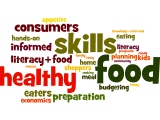We know anecdotally that we do great work with our young people. How do we know that? Because our students come back and tell us so! But unless we have the street-cred evidence to support the anecdotes, hands-on food skill programs are overlooked and inadequately funded by our schools, communities and governments.
Teachers and community workers who work with our young people are time poor! At the end of our school and community day after giving so much of ourselves to our students and community participants, we don’t have time, energy or sometimes the necessary research skills (nor access to academic data bases) to evaluate our programs. For this reason, teachers like me need to be grateful for researchers in public health or nutrition organisations and universities who believe in our work sufficiently to conduct and report on the research in peer-reviewed journals and government reports.
I know that there are many researchers in the field committed to the cause of promoting hands-on skills programs and I would like to acknowledge the most recent work of researchers. Click on the hotlinks and if the link does not work because there is an updated URL please email and I will send you the work.
PS. Now that I have completed my PhD and are no longer affiliated with a university I no longer have access to full text academic journals.
From the United Kingdom (funded by SafeFood September 2014 ISBN: 978-1-905767-43-4)
Great to see some home economics teachers there!
Mr. Roy Ballam Education Programme Manager, British Nutrition Foundation
Ms. Ruth Balmer Nutritionist, Food Standards Agency Northern Ireland
Prof. Martin Caraher Professor of Food and Health Policy, City University London
Mr. Kenneth Carroll Managing Director at Carroll Food Services
Ms. Glynis Henderson Principle Officer Home Economics, Council for the Curriculum Examinations and Assessment
Ms. Claire Holmes Dietitian, Western Health and Social Care Trust
Ms. Amanda McCloat Head of Home Economics, St. Angela’s College, Sligo
Ms. Margaret O’Neill Community Dietitian, Health Service Executive
Food Skills: Definitions, Influences and Relationship with Health
Teacher resource Food Life Skills
From Denmark reported in the International Journal of Home Economics
Professor Jette Benn (2014) (Published in IJHE Vol 7 No 1 2014)
Food, nutrition or cooking literacy—a review of concepts and competencies regarding food education
From Hong Kong
Professor Wai Ling Theresa Lai-Yeung (2011) (Published in the Asia-Pacific Journal of Clinical Nutrition 2011;20 (1):87-94)
Nutrition education for adolescents: Principals’ views
From Australia
Dr Helen Vidgen and Professor Danielle Gallegos (2014) (Published in Appetite 76 2014 50–59)
Defining food literacy and its components
Dr Helen Vidgen and Professor Danielle Gallegos (2012)
Dr Sandra Fordyce-Voorham (2010)
The identification of food skills in skill-based healthy eating programs
From Canada
Sarah Colatruglio & Joyce Slater Food literacy: Bridging the Gap between Food, Nutrition and Wellbeing
Slater J, Falkenberg T, Colatruglio S, Rutherford J. (2016) Critical Food Literacy Competencies for Young Adults
From Scotland and Australia
Professor Donna Pendergast (Griffiths University, Qld) and Yvonne Dewhurst (University of Aberdeen) (Published in the International Journal of Home Economics Volume 5 No 2 2012)
Home Economics and Food Literacy: An International Investigation
From New Zealand
Teresa O’Sullivan (Otago University) Measuring Food Literacy (2015)
Home Economics and Food Literacy: An International Investigation
Please let me know if there are other additions- this is by no means an exhaustive list! I will be taking a break for the next few weeks as I will be on a European study tour with my students until early October 2014! Happy cooking and researching in the meantime!

What food skills should be taught in schools?